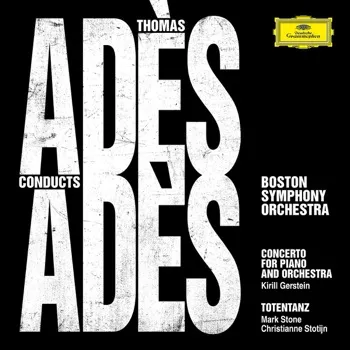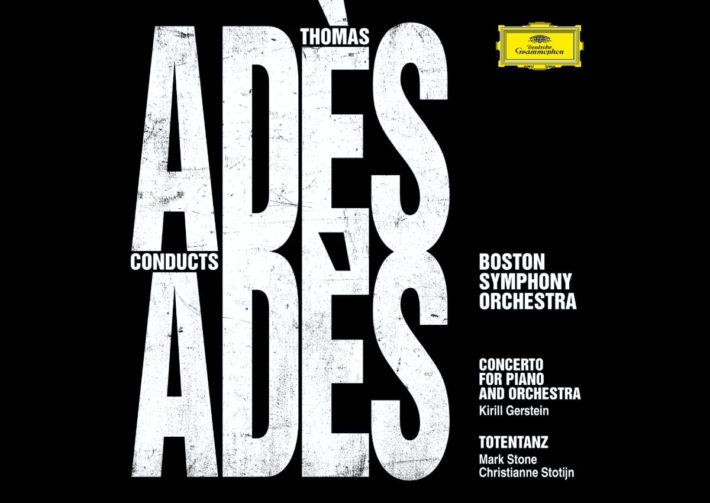Thomas Adès is one of today’s most performed composers of contemporary music: in his early career, he benefited from the passionate advocacy of Sir Simon Rattle, who included Adès’ “Asyla” in his first concert as the Berlin Philharmonic’s Music Director. More recently Adès’ opera “The Exterminating Angel” received almost universal acclaim at its European (Salzburg, 2016) and American (New York, 2017) premieres. Here we have two recent works: a Piano Concerto with Kirill Gerstein as the soloist, the premier performance of which is presented here, and “Totentanz” from 2013, a work for Baritone, Mezzo-Soprano and a large orchestra.

The concerto opens with two timpani strikes, the second bringing in the piano and orchestra, as if Adès saying, “Let’s GO!” Indeed, the first movement is a wild roller-coaster ride of contrasting moods, meters and virtuosic display. The opening theme is clearly related to Gershwin’s “I’ve Got Rhythm,” in part because the pianist for whom this concerto was written, Kirill Gerstein, is an excellent Gershwin player. Hearing his performance of this work certainly makes me want to hear his Gershwin and everything else he has recorded. His complete mastery of this exceedingly difficult score is breathtaking, and one is constantly amazed by the elegance and wildness, gentleness and power he brings to the music.
The Boston Symphony Orchestra also deserves accolades for their playing – searingly dramatic and deeply beautiful. Never is there any sense of discomfort or mere tolerance for Adès’ writing; instead, under the composer’s masterful direction, the Boston players offer a level of passion and technical aplomb that equals, and often surpasses, the playing heard in their ongoing Shostakovich cycle under Andris Nelsons. Adès is well known for writing with “irrational” time signatures (such as 2/6 and 4/12) but the Boston players dispatch this music as if they have it in their bones.
It is difficult to choose moments from the first or last movement that are particularly impressive – the music flies by and all of it is stunningly impressive. If the reader is worried that Adès’ writing will prove to be inaccessible and overly dissonant, anyone who enjoys the concertos of Prokofiev and Bartók has nothing to fear. Yet despite loving all the pyrotechnics on display in the outer movements, it was the second movement that remained with me long after listening. Having listened to many of Adès’ works over the years, I have always come away impressed by the riotous power of his scores, filled with colorful instrumentation (added by a fascinating use of percussion) and rhythmic vitality. But none of his music has had such direct emotional power before – just listen to the heart-breaking longing Adès’ expresses beginning at 3’24” – harmonies in search of stability that is never found, until the orchestra gives up and lets the piano search on its own (4’50”). The loneliness of this music proved to be deeply touching. A superb new Piano Concerto, then, which should become a part of the regular concerto repertoire.
The same is true of the companion piece, “Totentanz.” This is very much reminiscent of Shostakovich’s fourteenth symphony, in that both works use two soloists that sing several movements about death. Whereas Shostakovich’s symphony is for a small ensemble, Adès’ utilizes a rather large orchestra to allow himself a wider timbral palette with which to set the texts. The work, dedicated to the memory of Witold Lutosławski and his wife Danuta, sets anonymous text found under a 15th-century mural in the Marienkirche, Lübeck, Germany. The mural depicts members of humanity in descending order of “importance,” beginning with the Pope and ending with a new-born baby. The humans are represented by the soprano, while death, who invites each member of humanity to join him, is represented by the baritone.
“Totentanz” is theatrical and extremely vivid, and the orchestration is a constant source of wonder, as Adès paints the texts in his music. Over its 35-minute duration, the music’s intensity rarely lets up; by midway of Track 13 the relentless, percussion-driven motoric writing (again reminiscent of Shostakovich) is simply overwhelming. The onslaught does finally lessen, and in the final two movements (death speaking to a maiden and then a baby), Adès’ writing resembles the rarefied atmosphere of Mahler’s “Das Lied von der Erde.” The singing of Mark Stone and Christianne Stotijn is incredible, each fully meeting the demands of what must be particularly exhausting music to sing.
The live recording is first-rate, and even though 55 minutes seems a little short for a new recording, adding any additional material would surely blunt the deeply powerful emotional effect of these pieces. This is an exceptional recording of significant contemporary music that offers plentiful rewards with repeated listening – urgently recommended.
“Adès Conducts Adès
Thomas Adès – Piano Concerto, “Totentanz”
Kirill Gerstein – Piano
Boston Symphony Orchestra
Thomas Adès – Conductor
Deutsche Grammophon, CD 4837998




















